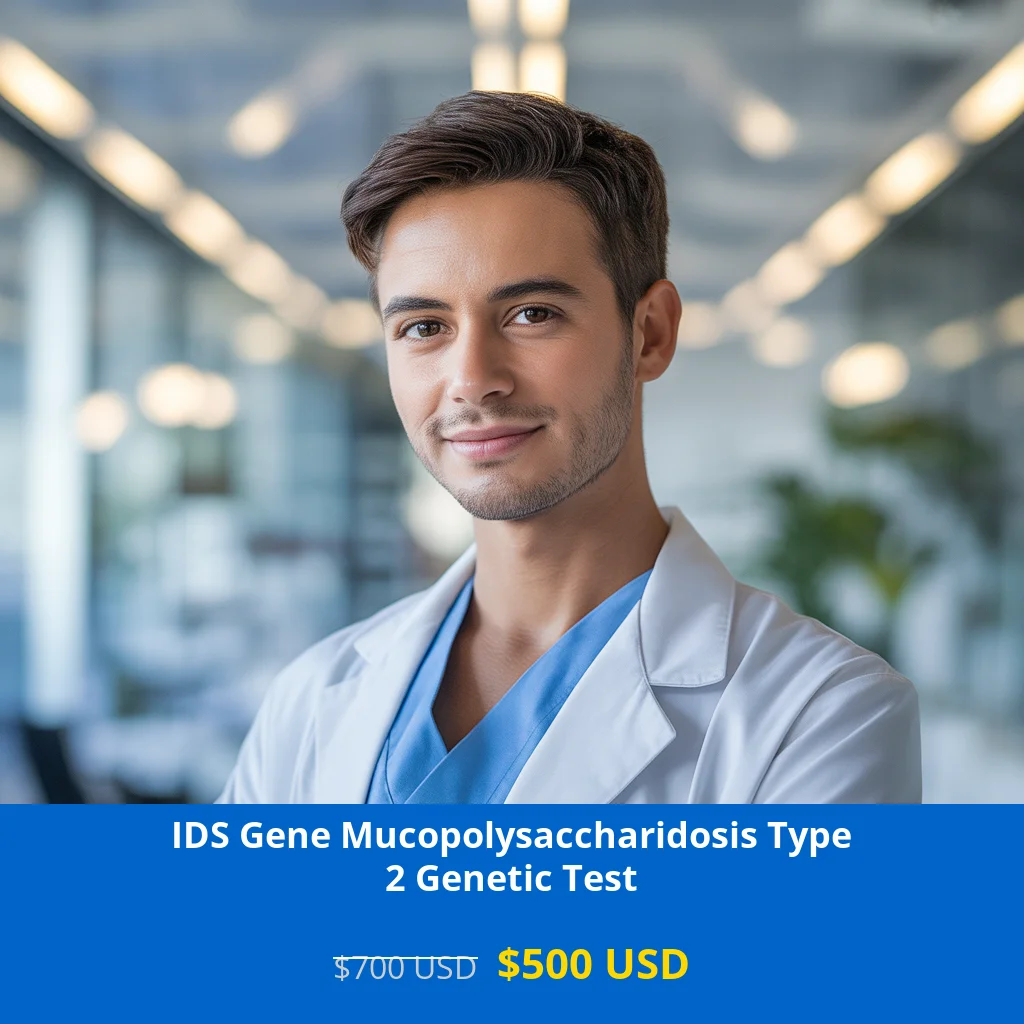IDS Gene Mucopolysaccharidosis Type 2 NGS Genetic DNA Test
Understanding Mucopolysaccharidosis Type 2 (Hunter Syndrome)
Mucopolysaccharidosis Type 2, commonly known as Hunter Syndrome, is a rare inherited metabolic disorder that primarily affects males. This condition results from deficient activity of the enzyme iduronate-2-sulfatase (IDS), which is essential for breaking down complex sugar molecules called glycosaminoglycans (GAGs). When this enzyme is deficient, GAGs accumulate in cells throughout the body, leading to progressive cellular damage and multi-system complications.
What Does This Test Measure?
The IDS Gene Mucopolysaccharidosis Type 2 NGS Genetic DNA Test utilizes advanced Next-Generation Sequencing technology to comprehensively analyze the IDS gene located on the X chromosome. This sophisticated testing approach detects:
- Point mutations and small deletions/insertions in the IDS gene
- Gene rearrangements and complex structural variations
- Specific genetic variants associated with enzyme deficiency
- Inheritance patterns for family planning purposes
Who Should Consider This Test?
Clinical Indications and Symptoms
This genetic test is recommended for individuals presenting with symptoms suggestive of Hunter Syndrome, including:
- Physical Characteristics: Coarse facial features, enlarged tongue, thickened skin
- Developmental Concerns: Delayed milestones, cognitive impairment, behavioral changes
- Musculoskeletal Issues: Joint stiffness, short stature, skeletal abnormalities
- Organ Involvement: Enlarged liver and spleen, heart valve problems, respiratory issues
- Hearing and Vision: Progressive hearing loss, visual impairments
At-Risk Populations
- Males with family history of Hunter Syndrome
- Individuals with unexplained developmental delays
- Patients with characteristic physical findings of mucopolysaccharidosis
- Families seeking carrier testing and genetic counseling
Benefits of IDS Genetic Testing
Early Intervention and Management
Early diagnosis through genetic testing provides numerous advantages:
- Timely Treatment: Enables early initiation of enzyme replacement therapy
- Proactive Monitoring: Facilitates regular assessment of disease progression
- Symptom Management: Allows for targeted interventions for specific complications
- Family Planning: Provides crucial information for reproductive decisions
- Clinical Trial Eligibility: Opens opportunities for emerging therapies
Comprehensive Genetic Counseling
Our testing includes pre-test genetic counseling to:
- Create detailed family pedigree charts
- Explain inheritance patterns and recurrence risks
- Discuss implications for other family members
- Provide emotional support and resources
Understanding Your Test Results
Interpretation Guidelines
Your genetic test results will fall into one of several categories:
Positive Result
A positive result indicates the presence of pathogenic variants in the IDS gene consistent with Hunter Syndrome. This confirmation enables:
- Immediate referral to metabolic specialists
- Initiation of appropriate medical management
- Family member testing recommendations
- Comprehensive care planning
Negative Result
A negative result suggests that no disease-causing variants were detected in the IDS gene. However, clinical correlation with symptoms remains essential, as rare genetic mechanisms might not be identified by current testing methods.
Variant of Uncertain Significance (VUS)
Some genetic changes may have unclear clinical implications. In such cases, additional family studies and periodic re-evaluation may be recommended as scientific knowledge advances.
Test Details and Pricing
| Test Component | Details |
|---|---|
| Test Name | IDS Gene Mucopolysaccharidosis Type 2 NGS Genetic DNA Test |
| Regular Price | $700 USD |
| Discount Price | $500 USD |
| Turnaround Time | 3 to 4 Weeks |
| Sample Type | Blood, Extracted DNA, or One Drop Blood on FTA Card |
| Testing Method | Next-Generation Sequencing (NGS) |
Pre-Test Requirements
Before testing, we require:
- Complete clinical history of the patient
- Genetic counseling session to create family pedigree
- Informed consent for genetic testing
- Insurance pre-authorization when applicable
Nationwide Testing Availability
We have diagnostic centers conveniently located across the United States, serving major metropolitan areas including:
- Northeast: New York, Boston, Philadelphia
- West Coast: Los Angeles, San Francisco, Seattle
- Midwest: Chicago, Detroit, Minneapolis
- South: Houston, Dallas, Atlanta, Miami
- Southwest: Phoenix, Denver, Las Vegas
Take Action Today
Early detection of Mucopolysaccharidosis Type 2 can significantly impact treatment outcomes and quality of life. Our comprehensive genetic testing provides the clarity needed for informed medical decisions and family planning.
Ready to schedule your test? Contact our genetic specialists today:
Call or WhatsApp: +1(267) 388-9828
Our dedicated team is available to answer your questions, explain the testing process, and help you take the next step toward genetic clarity and proactive health management.







